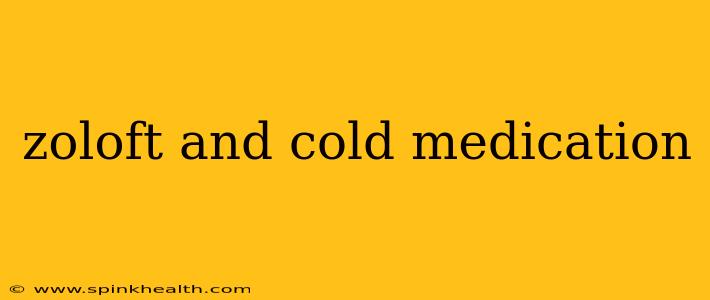Zoloft and Cold Medication: Navigating the Interactions Safely
The sniffles, the cough, the congestion – a cold can be miserable enough without adding the worry of medication interactions. If you're taking Zoloft (sertraline), a common antidepressant, this concern is amplified. Understanding how Zoloft interacts with cold medications is crucial for managing both your mental health and your physical symptoms effectively and safely. This isn't just about avoiding a bad reaction; it's about ensuring your treatment remains as effective as possible. Let's explore this together.
Can I take cold medicine while on Zoloft?
This is the million-dollar question, and unfortunately, there's no simple yes or no answer. The safety of combining Zoloft with cold medication depends heavily on which cold medication you're considering. Some cold remedies are perfectly fine, while others can potentially cause dangerous interactions. The key is to always check the labels carefully and, most importantly, consult your doctor or pharmacist. They can advise you based on your specific medications and health status.
This isn't just a matter of being cautious; it's about preventing potentially serious consequences.
What are the potential interactions between Zoloft and cold medicine?
Many cold medications contain ingredients that can interact with Zoloft. Some common culprits include:
-
Decongestants (like pseudoephedrine or phenylephrine): These can raise blood pressure, and this effect could be intensified when combined with Zoloft, particularly in individuals already predisposed to hypertension.
-
Antihistamines (like diphenhydramine or chlorpheniramine): While often causing drowsiness on their own, these can enhance the sedative effects of Zoloft, leading to excessive sleepiness and impaired cognitive function. This is especially dangerous if you operate machinery or drive.
-
Cough suppressants (like dextromethorphan): While generally considered safe, some individuals might experience heightened drowsiness or other side effects when combining them with Zoloft. Again, the interaction depends on individual factors.
-
Pain relievers (like acetaminophen or ibuprofen): These are generally considered safe to use with Zoloft in typical doses, but it's always best to inform your doctor or pharmacist.
What cold medicines are generally considered safe to take with Zoloft?
While every individual's response varies, some cold medications are typically considered lower risk when taken with Zoloft. These often contain only acetaminophen or ibuprofen for pain relief, and sometimes saline nasal spray to relieve congestion. However, it's vital to always check with your doctor or pharmacist before using any medication, even those seemingly innocuous. They can confirm the safety for your specific situation.
What should I do if I experience unexpected side effects?
If you experience any unusual side effects after taking cold medicine while on Zoloft, such as increased drowsiness, dizziness, rapid heartbeat, or difficulty breathing, stop taking the cold medication immediately and contact your doctor or pharmacist right away. Early intervention is key in managing potential adverse reactions.
Is there a better way to manage cold symptoms while on Zoloft?
Beyond medication, there are many ways to manage cold symptoms. Rest, plenty of fluids, and a healthy diet can significantly alleviate discomfort. Things like saline nasal sprays, throat lozenges, and warm broth can provide relief without the risk of medication interactions. These methods can often be just as effective as over-the-counter medicines. Remember to prioritize rest to support your overall well-being and your treatment.
This information is for general knowledge and does not constitute medical advice. Always consult with your doctor or pharmacist before taking any medication, especially if you are already taking other prescriptions, to ensure its safety and efficacy for your specific situation. Your health is paramount, and seeking professional guidance ensures you remain safe and well.

